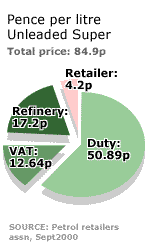T
Tom
Guest
I'm considering having my car modified to run on pure vegetable oil. I'm considering this because I'm not entirely certain if I could get away with pouring it straight into the tank.
I have an Audi A4 1.9Tdi, basically a VW engine, which is designed to run off rapeseed oil as well as normal DERV.
The advantage for me is that I can buy 20litres of veggie oil from Makro at £10, that means I can fill my car for about £30, a lot cheaper than the £50 it costs with DERV.
Yes I know about the taxman, but tbh, I'll still be putting some money his way because I'll run the engine on a 60/40 mix of DERV/SVO (if it doesn't need modding), and we all know how motorists are a cash cow for the government.
Anybody here done a similar thing?
I have an Audi A4 1.9Tdi, basically a VW engine, which is designed to run off rapeseed oil as well as normal DERV.
The advantage for me is that I can buy 20litres of veggie oil from Makro at £10, that means I can fill my car for about £30, a lot cheaper than the £50 it costs with DERV.
Yes I know about the taxman, but tbh, I'll still be putting some money his way because I'll run the engine on a 60/40 mix of DERV/SVO (if it doesn't need modding), and we all know how motorists are a cash cow for the government.
Anybody here done a similar thing?

